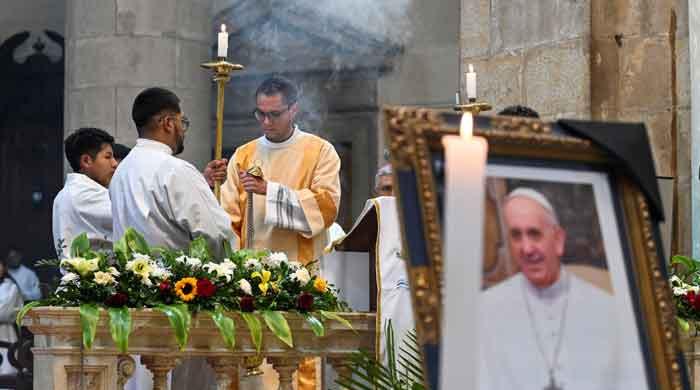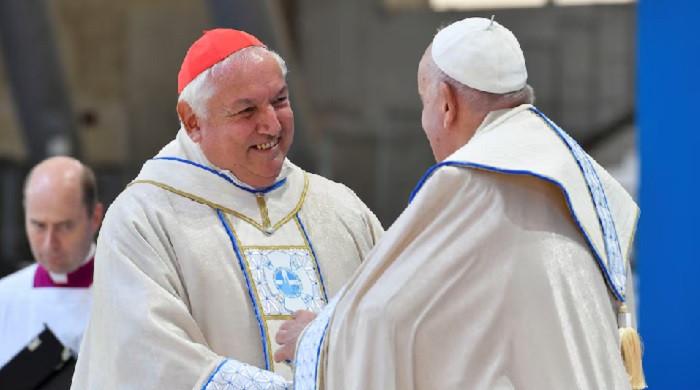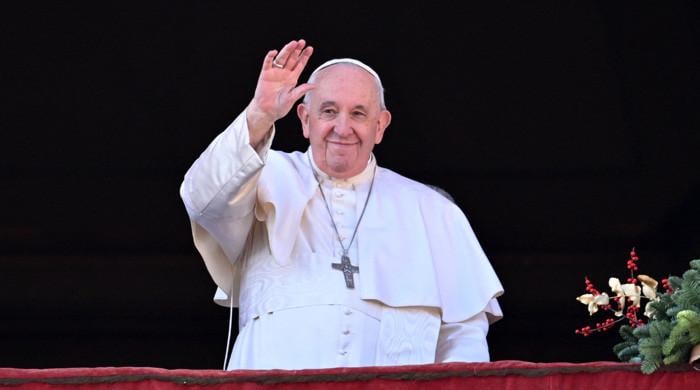Guide to UK election
Prime Minister Theresa May called for an early election to be held on June 8, saying she needed to strengthen her hand in divorce talks with the European Union by bolstering support for her Brexit...
June 06, 2017


CONSERVATIVE PARTY
Won 331 seats (36.9%) in the 2015 election and currently holds 331 in the House of Commons
The Conservatives say only they can provide the "strong and stable" leadership needed to guide Britain through the Brexit process.
BREXIT
The Conservatives have promised to curb immigration, end the days of vast annual payments to the EU, leave the bloc's single market and secure a comprehensive free trade deal with the EU. They have ruled out giving people a vote on the final deal but have said parliament will get to scrutinise it. They have said they are willing to walk away from negotiations as "no deal is better than a bad deal".
ECONOMY
The Conservatives have said they will balance the budget deficit by the middle of the next decade and reduce taxes on business and working families. They also plan to give the state more of an influence over corporate Britain, including clamping down on executive pay and making it harder for foreign firms to take over British ones.
IMMIGRATION
The party has pledged to cut annual net migration below 100,000 but has not given a target date. It has said it will have a new immigration policy that will see the number of people coming to the UK from the EU reduced and controlled while still attracting the workers the economy needs. It has also promised to toughen visa requirements for students and increase the charge levied on companies employing migrant workers.
DEFENCE
The Conservatives have promised to retain Britain's Trident nuclear weapons and said they will continue to meet NATO's target of spending at least 2 percent of GDP on defence. They have also promised to increase the defence budget by at least 0.5 percent above inflation in every year of the new parliament.

LABOUR PARTY
Won 232 seats (30.4%) in the 2015 election and currently holds 229 in the House of Commons
Labour say the Conservatives are governing in the interests of the "privileged few" and have said they will build a fairer society.
BREXIT
Labour have said the Brexit vote must be respected. They have promised to immediately guarantee the rights of EU nationals in Britain and have said they would seek to maximise access to the EU's single market and safeguard workers' rights in Brexit negotiations.
ECONOMY
Labour has promised to increase income tax for the highest 5 percent of earners, renationalise rail companies and energy supply networks and invest 250 billion pounds in infrastructure over the next 10 years. It has also pledged a raft of measures to boost workers' rights, including raising the minimum wage and banning zero hours contracts.
IMMIGRATION
Labour has promised to end EU freedom of movement but has said it will prioritise jobs and prosperity over immigration targets. It wants to develop a new immigration system based on economic need and has also pledged to crack down on unscrupulous employers and overseas-only recruitment practices.
DEFENCE
Labour has said it will support the renewal of Britain's nuclear deterrent while working with international partners to seek to create a nuclear-free world. It has said it will pledge to meet NATO's target of spending at least 2 percent of GDP on defence and will put conflict resolution and human rights at the heart of its foreign policy.

LIBERAL DEMOCRAT
Won 8 seats (7.9%) in the 2015 election and currently holds 9 in the House of Commons
The Liberal Democrats says the government is leading Britain towards a "hard Brexit" and they want to fight to keep Britain in the EU's single market.
BREXIT
The Liberal Democrats say Britain should remain within the EU's single market and protect the rights of people to work, travel and study across the EU. They believe Britain is better off in the EU and have promised to hold a second referendum on the final deal, with the option of remaining in the EU on the ballot paper.
ECONOMY
The Liberal Democrats have promised to boost the economy with a major programme of capital investment. They have also pledged to eliminate the deficit on day-to-day spending by 2020 and increase income tax by 1p to invest in public services.
IMMIGRATION
The Liberal Democrats have promised to make the positive case for immigration and have said they will continue to allow high-skilled immigration to support key sectors of the economy. It will also create a fund to help local communities with the pressures migration puts on public services.
DEFENCE
The Liberal Democrats favour ending continuous at-sea nuclear deterrent, saying Britain should move to three rather than four submarines.

UK INDEPENDENCE PARTY
Won 1 seat (12.6%) in the 2015 election and currently holds none in the House of Commons
UKIP warn that giving the Conservatives a bigger majority would allow them to backslide on Brexit and they want to hold the prime minister's feet to the fire to ensure she follows through on her promises.
BREXIT
UKIP has said its Brexit deal objectives include full control of immigration, no divorce payment to the EU, full maritime sovereignty, supremacy of the British parliament in making laws and freedom to do trade deals with any country.
ECONOMY
UKIP has not set out its economic policy for the election yet but among things previously outlined it has said it would reduce foreign aid and spend the money on UK taxpayers instead.
IMMIGRATION
UKIP has promised to cut net migration to Britain to zero by introducing a points-based system like that used in Australia.
DEFENCE
UKIP supports renewing Britain's nuclear deterrent and has called for greater investment in Britain's armed forces.

SCOTTISH NATIONAL PARTY
Won 56 seats (4.7%) in the 2015 election and currently holds 54 in the House of Commons
The SNP say Scotland is being taken out of the EU against its will, they vow to fight against a "hard Brexit" and want to hold a second referendum on Scottish independence before Britain leaves the EU.
BREXIT
The SNP do not want Scotland taken out of the EU and are seeking a second independence referendum, after which they hope an independent Scotland can remain in the bloc.
ECONOMY
The SNP has said it wants a fairer, more sustainable economy in Scotland, and has previously pushed for devolution of powers on job creation, taxation, welfare and wages to the Scottish parliament.
IMMIGRATION
The SNP believe immigration is essential for the economy and wants a system that meets Scotland's social and economic needs
DEFENCE
The SNP opposes the renewal of Britain's nuclear weapons, which are based in Scotland.
How the race tightened in Britain's 'Brexit' election

When Britain's election campaigning began, Peter Anthony, a candidate for the Conservatives, was hopeful that he could win in Blackpool, a working class town on England's north-west coast. Though the seat he is standing for has been held by left-leaning Labour for 20 years, Anthony felt change was in the air.
"I'm very optimistic," he said last month, adding that the response he was getting from voters was "completely different" from the election in 2015.
Early polls suggested the centre-right Conservatives, led by Prime Minister Theresa May, could achieve an overall landslide, possibly even a majority as decisive as those held by Margaret Thatcher, Britain's first woman prime minister from 1979 to 1990.
But in the past few weeks the Conservatives' lead – about 20 percentage points when the election was announced – has fallen. May's campaign stumbled over a U-turn on social care policy, and she declined to take part in televised debates with her opponents. Meanwhile, the main opposition Labour party, led by Jeremy Corbyn, proposed increases in public spending that grabbed the attention of voters.
On Saturday a van and knife attack that killed seven people in the heart of London shifted the focus to security. Corbyn criticised May's record as interior minister of cutting police numbers, and May said Corbyn was weak on terrorism.
Recent surveys have shown the Conservatives ahead of Labour by between 1 and 12 percentage points. Different poll models give a wide range of projected results. Some predict May will increase her majority, but one projection suggests she could lose parliamentary seats. Pollsters warn that much still depends on the level of voter turnout.
Anthony remains optimistic. A key reason: Last year, he, like the majority of Britons, backed the campaign to take Britain out of the European Union.
"It's very, very difficult to find someone who didn't support leaving the EU," said Anthony as a train on the city's landmark rollercoaster, the Big One, clattered around the tracks behind him.
His town is one of around 50 places where Labour's majority is small enough for Conservatives to target voters who wanted out of Europe. The Conservatives, long more eurosceptic than Labour, have the largest chunk of pro-Brexit support, studies have shown. In particular, the Conservatives have picked up votes from the United Kingdom Independence Party (UKIP), which got nearly 13 percent of the vote in the 2015 election. UKIP now languishes at about 4 percent in the polls.
As the June 8 poll approaches, Brexit has partly receded as an important divider between the main parties. Last week Corbyn set out Labour's approach to the issue, making plain that he, like May, sees no going back on Brexit. There was "no doubt," he said, that Britain would leave the EU.
However, May has said she is willing for Britain to leave the EU without a deal if negotiations fail, while Corbyn has said he would not leave without an agreement.
MAY'S STUMBLE
It was in Blackpool in 1968 that a young Margaret Thatcher gave a speech to the Conservative Party conference on the theme "What's wrong with politics?" Her answer - too much government – came to influence Britain for decades.

But May is no Thatcher. The launch of her party manifesto on May 18 was widely seen as nudging the Conservatives leftwards in a bid to seize the centre ground. The manifesto adopted some of Labour's previous policy proposals, including a promised cap on energy prices and new rights and protection for workers in the gig economy. While Labour's campaign slogan is "For the many, not the few," May has promised a country that works, "not for the privileged few, but for everyone."
She has proposed new rules on business, including measures to restrict top-level executive pay, guarantee worker representation on boards, and new limits on "aggressive asset-stripping or tax avoidance" in takeovers. "We do not believe in untrammelled free markets," the Conservative manifesto says. "We reject the cult of selfish individualism."
But in a bid to balance the nation's finances as well as be more inclusive, the Conservatives also floated one policy that caught voters' attention. The party proposed that more of the costs of caring for the sick elderly should come from the sale of their homes. The new plan was quickly dubbed a "dementia tax" in the media.
There was a furore and May backtracked. While May had campaigned on a slogan of "strong and stable government," the spotlight turned onto her willingness to make U-turns. The party's "strong and stable" mantra was widely mocked on social media.
At a press conference, May said "nothing has changed." A spokesman said: "Categorically, we haven't done a U-turn." But the Conservatives' lead in the polls began to erode.
RADICAL OUTSIDER
Under Corbyn, Labour has moved away from the centre ground once occupied by Tony Blair, who won three elections for the party between 1997 to 2005. A veteran from the trade union movement, Corbyn has a track record of radical activism, often voting against the government when Labour was in power, and he still presents himself as an outsider.

His manifesto promises include nationalisation of energy and water supplies, investing 250 billion pounds ($320 billion) over 10 years in infrastructure, more staff for the National Health Service, police and fire services, an end to tuition fees for students, more free childcare, extra holidays, and higher taxes on business and the top 5 percent of earners.
He has courted young people and won hundreds of thousands of followers on social media. Labour traditionally polls well among young people and about a million new voters aged 18 to 24 have registered to vote since the election was announced.
Turnout may prove crucial. Past experience indicates that the young are far less likely to vote than the elderly, who favour the Conservatives.
Corbyn, 68, began the campaign lowly rated as a leader and potential prime minister by many voters - and even by some of his own party candidates. On May 22 the Labour contender in Sedgefield, the constituency which sent Blair to parliament, wrote a note to his constituents, saying: "I am no supporter of Theresa May and I am no supporter of Jeremy Corbyn – the only people I support are you."
But recently Corbyn's ratings have improved. In a survey late last month by YouGov, a pollster, 35 percent of respondents rated Corbyn favourably, up from only 22 percent a month previously.
An adviser in Corbyn's campaign said his improved ratings reflected how broadcasters must give balanced coverage of campaigning and that "many voters are seeing the real Jeremy and Labour's policies unfiltered for the first time, and many are liking what they see."











